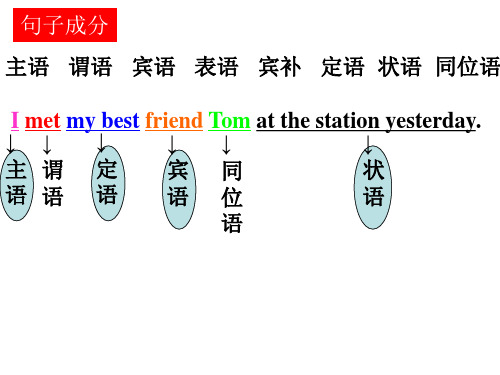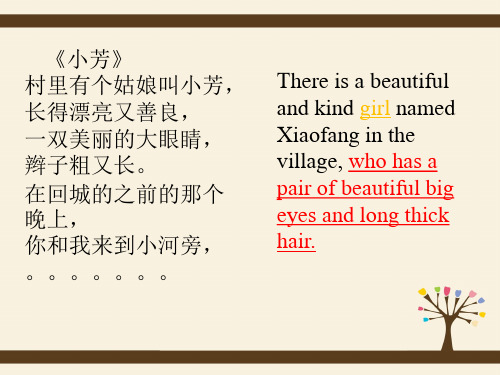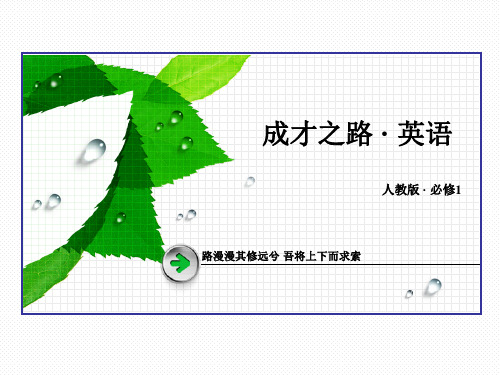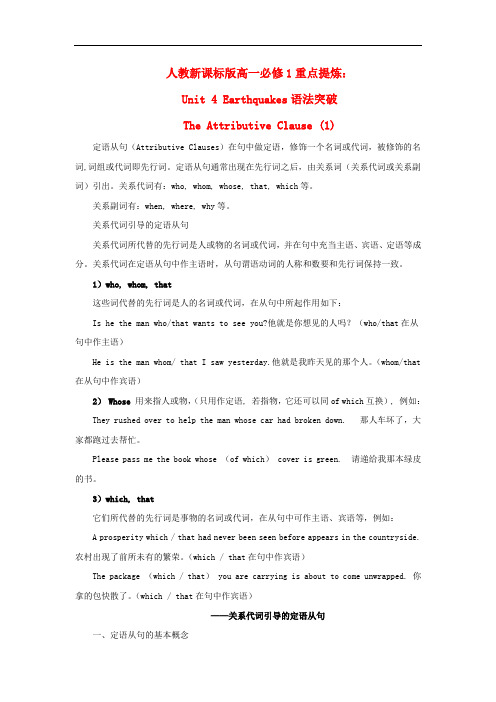必修1 Unit 4 Earthquakes定语从句
- 格式:doc
- 大小:342.00 KB
- 文档页数:16





人教新课标版高一必修1重点提炼:Unit 4 Earthquakes语法突破The Attributive Clause (1)定语从句(Attributive Clauses)在句中做定语,修饰一个名词或代词,被修饰的名词,词组或代词即先行词。
定语从句通常出现在先行词之后,由关系词(关系代词或关系副词)引出。
关系代词有:who, whom, whose, that, which等。
关系副词有:when, where, why等。
关系代词引导的定语从句关系代词所代替的先行词是人或物的名词或代词,并在句中充当主语、宾语、定语等成分。
关系代词在定语从句中作主语时,从句谓语动词的人称和数要和先行词保持一致。
1)who, whom, that这些词代替的先行词是人的名词或代词,在从句中所起作用如下:Is he the man who/that wants to see you?他就是你想见的人吗?(who/that在从句中作主语)He is the man whom/ that I saw yesterday.他就是我昨天见的那个人。
(whom/that 在从句中作宾语)2) Whose 用来指人或物,(只用作定语, 若指物,它还可以同of which互换), 例如:They rushed over to help the man whose car had broken down. 那人车坏了,大家都跑过去帮忙。
Please pass me the book whose (of which) cover is green. 请递给我那本绿皮的书。
3)which, that它们所代替的先行词是事物的名词或代词,在从句中可作主语、宾语等,例如:A prosperity which / that had never been seen before appears in the countryside. 农村出现了前所未有的繁荣。

人教新课标版高一必修1重点提炼:Unit 4 Earthquakes语法突破The Attributive Clause (1)定语从句(Attributive Clauses)在句中做定语,修饰一个名词或代词,被修饰的名词,词组或代词即先行词。
定语从句通常出现在先行词之后,由关系词(关系代词或关系副词)引出。
关系代词有:who, whom, whose, that, which等。
关系副词有:when, where, why等。
关系代词引导的定语从句关系代词所代替的先行词是人或物的名词或代词,并在句中充当主语、宾语、定语等成分。
关系代词在定语从句中作主语时,从句谓语动词的人称和数要和先行词保持一致。
1)who, whom, t hat这些词代替的先行词是人的名词或代词,在从句中所起作用如下:Is he the man who/that wants to see you?他就是你想见的人吗?(who/that在从句中作主语)He is the man whom/ that I saw yesterday.他就是我昨天见的那个人。
(whom/that在从句中作宾语)2)Whose 用来指人或物,(只用作定语, 若指物,它还可以同of which互换), 例如:They rushed over to help the man whose car had broken down.那人车坏了,大家都跑过去帮忙。
Please pass me the book whose (of which)cover is green.请递给我那本绿皮的书。
3)which, that它们所代替的先行词是事物的名词或代词,在从句中可作主语、宾语等,例如:A prosperity which / that had never been seen before appears in the countryside. 农村出现了前所未有的繁荣。
教师版必修一unit4Earthquakes第3讲▲同步语法关系代词引导定语从句用法点击关系代词引导的定语从句所修饰的先行词往往是表示人或物的名词或代词,关系代词要在从句中充当主语、表语、宾语、定语等成分。
常见的关系代词有who, whom, whose, that, which 等。
一、常见关系代词的用法1. whowho在定语从句中担当主语,其先行词必须是表示人的名词或代词。
who也可以代替在从句中担任宾语的whom,但是它前面不能有介词。
如:The students who don’t study hard will not pass the exam.I have a friend who likes listening to classical music. (who在从句中作主语,代替前面的a friend)The man who\that is shaking hands with my father is a policeman.2. whomwhom在定语从句中作动词或介词的宾语,其先行词也通常是表示人的名词或代词。
在口语中,whom通常可以被who或that所代替,在一般情况下可省略。
如:Is that the man with whom you arrived yesterday? (whom在从句中作介词的宾语,代替前面的the man)Mrs Smith (whom) you met last week is a friend of mine.3. whosewhose是所有格,在定语从句中作定语,后面要接名词,其含义是“……的”。
whose既可以指人也可以指物。
如:This is the scientist whose name is known all over the country.I want to talk to the boys whose homework hasn’t been handed in .They rushed over to help the man whose car had broken down. (whose是the man的所有格,在从句中作定语)【注意】当先行词是物时,作定语的whose也可用of which来表示。
【本讲教育信息】一、教学内容查理·史密斯去年退休了,他曾经是我的老师。
(二)引导词的作用英语中的关系词可分为关系代词和关系副词。
关系代词:who, whom, whose, which, that, as关系副词:when, where, why关系词的作用:既引导定语从句,又在定语从句中充当某种成分。
(三)关系代词that/ which / who / whom/ whose/as 引导的定语从句1. that在从句中作主语或宾语(可省略),指人或物。
例:A plane is a machine that can fly.飞机是一种会飞的机器。
I don’t know about the man that you mentioned just now.我不认识你刚才提到的那个人。
2. which 在从句中作主语或宾语(可省),指物.A. the screen of whomB. whom the screen ofC. which the screen ofD. the screen of which答案:CBD5. 关系代词as 在从句中作主语,宾语或表语,指人或物。
关系代词as 既可引导限制性定语从句,也可引导非限制性定语从句。
(1)as引导的限制性定语从句。
例:I have got into the same trouble as he has.我遇到了和他一样的麻烦。
Such problems as are often mentioned should be solved.大家经常提到的这样的问题应当解决。
Here is so big a stone as no one can lift.这里有一块大得没人能搬动的石头。
辨析:the same…as …; the same …thatI want to buy the same pen as you are using.我想买一支和你正在用的一样的笔。
例:This is the very book that I’m looking for.这正是我要找的那本书。
The only thing that we can do for you is to give you some money.我们唯一能为你做的事情就是给你一些钱。
3. 当先行词是形容词最高级或它前面有形容词最高级修饰时。
例:This is the best that has been used against pollution.这是用过的用以减少污染的最好的办法。
This is the most interesting film that I’ve ever seen。
这是我看过的最有意思的电影。
4. 当先行词是序数词或前面有一个序数词时。
例:The train is the last that will go to the Suzhou.这是开往苏州的最后一辆列车。
⑤He is no longer the man ______he used to be .A. whoB. thatC. whomD. which答案:DBDBB(五)指物时,只用which 的情况有两种:一种是在非限制性定语从句中,关联词要用which;另一种是关系代词在从句中作介词宾语时,只能用which。
例:The novel, which I have read three times, is very touching.这本小说很动人,我已经读了三遍。
This is the great moment to which I’m looking forward.这就是我盼望的伟大时刻。
知识拓展:which 引导的非限制性定语从句,其先行词也可以代指整个句子。
例:He failed in the exam, which made his parents angry.There are many young men who are against the plan.有很多年轻人反对这个计划。
即学即用:Women _______ drink more than two cups of coffee a day have a greater chance of having heart disease than those ________ don’t.A. who; 不填B. 不填; whoC. who; whoD. 不填; 不填答案:C定语从句中需要特别注意的几个问题。
(一)as, which 引导的非限制性定语从句的区别As is known to all, Edison invented the telephone.= Edison invented the telephone, as is known to all.正如大家都知道的那样,爱迪生发明了电话。
He turned out to be very successful, which was more than we could expect.结果证明他很成功,这一点超出了我们的想象。
分析:as引导的定语从句,既可以放在句首,也可以放在句尾。
意思是“正如……”The girl for whom he had fought all his life no longer seemed important to him.他为之而奋斗终生的女孩对他来说似乎已不再重要。
He is the man about whom we were talking just now.他就是我们刚才谈论的那个人。
2. 根据从句中先行词与介词的习惯搭配例:The speed at which wild animals are being destroyed has increased.野生动物遭破坏的速度在增加。
3.看定语从句中形容词与介词的搭配This is the hero of whom we are proud .这就是那位我们为之自豪的英雄。
注意:1)关系代词在定语从句中作介词宾语时,关系代词只能用which 或whom; 不可用that 或who 代替。
2)该介词通常可以放在关系代词之前,也可放在从句之尾。
但有些固定的动介词组不答案:CDCCCUnit 5 预习导学重点单词quality n. 质量;品质;性质mean adj. 吝啬的;自私的;卑鄙的active adj. 积极的;活跃的generous adj. 慷慨的;大方的selfish adj. 自私的selfless adj. 无私的;忘我的selflessly adv. 无私地;忘我地devote vt. 献身;专心于devoted adj. 忠实的;深爱的found vt. 建立;成立principle n.法则;原则;原理peaceful adj. 和平的;平静的;安宁的lawyer n. 律师guidance n. 指导;领导legal adj. 法律的;依照法律的fee n. 费;酬金hopeful adj. 怀有希望的;有希望的stage n. 舞台;阶段;时期attack vt. 进攻;攻击;抨击violence n. 暴力;暴行equal adj. 相等的;平等的willing adj. 乐意的;自愿的unfair adj. 不公正的;不公平的escape vi. 逃脱;逃走;泄露educate vt. 教育;训练educated adj. 受过教育的;有教养的beg vi. 请求;祈求relative n. 亲戚;亲属terror n. 恐怖;可怕的人;恐怖时期;恐怖活动cruelty n. 残忍;残酷reward n. 报酬;奖金vt. 酬劳;奖赏president n. 总统;会长;校长;行长opinion n. 意见;看法;主张重点短语believe in 信任;信仰free from 摆脱(不好的东西)的,无……的be in prison 在狱中,被监禁continue to do sth. 继续做某事as a matter of fact 实际上;事实上allow sb. to do sth. 允许某人做某事in trouble 在危险,受罚,痛苦,不幸,忧虑等的处境中turn to 求助于;致力于lose heart 丧失勇气或信心重点句型1. The last thirty years have seen the greatest number of laws stopping our rights…△see为(某事)发生之时;目睹。
2. We read books under our blankets and used anything we could find to make candles to see the words.△不定式作状语3. We first broke the law in a way which was peaceful; when this was not allowed… only then did we decide to answer violence with violence.△which 引导定语从句,作主语,不能省略。
8. Today the public is much concerned about the way _______.A. nature is being ruinedB. which nature is ruinedC. on which to ruin natureD. of nature to be ruined9. Instead of ________sights, Edison would spend the time ________in the public library.A. seeing, to readB. see, readC. to see, to readD. seeing , reading*10. Mary and I see each other ________,but not as often as we used to.A. sooner or laterB. once in a whileC. in the endD. more or less**11. Please do me a favor --_____ my friend Mr. Smith to Youth Theater at 7:30 tonight.A. to inviteB. invitingC. inviteD. invited**12. Is this the website_______ you want to have ____ into your files to help you learn English?A. who; to addB. that; addC. whom; addingD. that; added*13. I travel to the Binhai New Area by light railway every day, _____ do many businessmen who live in downtown Tianjin.A. asB. whichC. whenD. though17. A. over B. off C. in D. on18. A. shout B. cry C. smile D. throw19. A. lost B. got C. received D. needed20. A. rich B. poor C. handsome D. brave21. A. begged B. agreed C. allowed D. refused22. A. car B. shoes C. suitcase D. clothes23. A. box B. wheel C. paper D. bill24. A. unhappy B. scared C. excited D. unfriendly25. A. yard B. office C. school D. home26. A. As soon as B. As long as C. As well as D. So far as27. A. one B. it C. this D. that28. A. So B. However C. What’s worse D. In general29. A. run B. jump C. climb D. walk30. A. brother B. family C. friend D. boss31. A. no longer B. at last C. at first D. once again32. A. spend B. save C. make D. borrow33. A. told B. asked C. answered D. warned34. A. shop B. work C. sleep D. buy35. A. always B. often C. ever D. never第三部分:阅读理解A*Many teenagers feel that the most important people in their lives are their friends. They believe that their family members, especially their parents, don’t know them as well as their friends do. In large families, it is often for brothers and sisters to fight with each other and then they can only go to their friends for advice. It is very important for teenagers to have one good friend or many friends. Even when they are not with their friends, they usually spend a lot of time talking among themselves on the phone. This c ommunication is very important in children’s growing up, because friends can discuss something difficult to say to their family members.However, parents often try to choose their children’s friends for them. Some parents may even stop their children from meeting their good friends. The question of “choice” is an interesting one. Have you ever thought of the following questions?Who choose your friends?Do you choose your friends or your friends choose you?Have you got a good friend your parents don’t like?36. Many teenagers think their _______ know them better than their parents do.A. friendsB. teachersC. brothers and sistersD. classmates37. When teenagers stay alone, the usual way of communication is to _________.A. go to their friends’B. talk with their parentsC. have a discussion with their familyD. talk with their friends on the phone38. Which of the following is DIFFERENT in meaning from the sentence “Some parents may even stop their children from meeting their go od friends.” ?A. Some parents may even not allow their children to meet their good friends.B. Some parents may even ask their children to stay away from their good friends.C. Some parents may even not let their children meet their good friends.D. Some parents may want their children to stop to meet their good friends.39. Which of the following sentences is TRUE?A. Parents should like everything their children enjoy.B. In all families, children can choose everything they like.C. Parents should try their best to understand their children better.D. Teenagers can only go to their friends’ for help.40. The main idea of this passage is that ___________.A. Teenagers need friendsB. Friends can give good adviceC. Parents often choose their children’s friends for themD. Good friends can communicate with each otherBIt is important for Americans to thank other people for favors even if what the other person did was very small. Both children and older people should be thanked for any kind act. The person accepting the thanks usually says something to make the favor seem small, or says that it was his pleasure to help you, or simply, “ You’re welcome.”It is equally important to apologize when you have hurt or disappointed someone. When possible, you should always add a reasonable explanation or excuse for your behavior. When there is some loss or damage to personal property(财产), the person responsible(负责) for the loss should both apologize and offer to pay for the item.Most of the time the other person accepts the apology graciously and doesn’t show any disappointment or anger. But if the problem was really serious or it happened several times before, the person might say something how he feels.41. It is necessary to thank a person who is _____ for any kind act.A. older than youB. younger than youC. the same age as youD. all of the above42. If you do any damage to someone’s property, you should _____.A. say how sorry you feel and offer to pay for the item.B. Just apologize for what you have done.C. Say nothing and try to forget about it.D. Pay for the damage without saying a word.43. When you apologize for something, you should ____.A. always remember to say it is not your fault.B. try to explain the reason for your actions.C. add an excuse even if it is not a good one.D. none of the above44. When someone apologizes to you, you should_____.A. accept the apology kindlyB. tell him how upset you areC. take no notice of him.D. give an angry reply and leave him alone.45. Choose the best title of this passage.A. Don’t hurt othersB. ThankingC. Habit of AmericansD. Thanking and ApologizingC *Are you carrying too much on your back at school? I’m sure lots of children of your age willsay “Yes”. Not only the students in China have this problem, but children in the United States also have heavy school bags.Doctors are starting to worry that younger and younger students are having back and neck problems as a result of school bags being too heavy for them.“It’s hard for me to go upstairs with my bag because it’s so heavy,” said Rick Hammond, an 11-year-old student in the US.Rick is among students who have common school bags with two straps(带子)to carry them, but many other students choose rolling(有滚轮的)bags.B. their teachers had better not ask them to do any homeworkC. they should only take home library books they will read that nightD. they should use thin workbooks instead of thick ones第四部分:用适当的关系代词填空The very film 1 is called Titanic is such a beautiful and sad love story 2 is popular with the public, 3 hero and heroine are Jack and Lucy. Lucy is a young beautifulwoman with 4 her mother went to America. Jack, 5 won a ship ticket by playing cards, is a poor painter. They met and fell in love with each other on Titanic 6 they had a happy time. Sadly, the nice journey was destroyed by an unexpected iceberg, during 7 Jack lost his life for saving Lucy (everyone will be moved by the selfless way 8 most people can’t behave in real life ). Before Jack left Lucy forever, he encouraged Lucy to live well for him. 9 is known to all, love is the strongest strength. And that’s the reason for 10 Lucy could live alone and told us the moving story.【试题答案】第一部分1. A. 解析:第一个空考查介词的搭配。